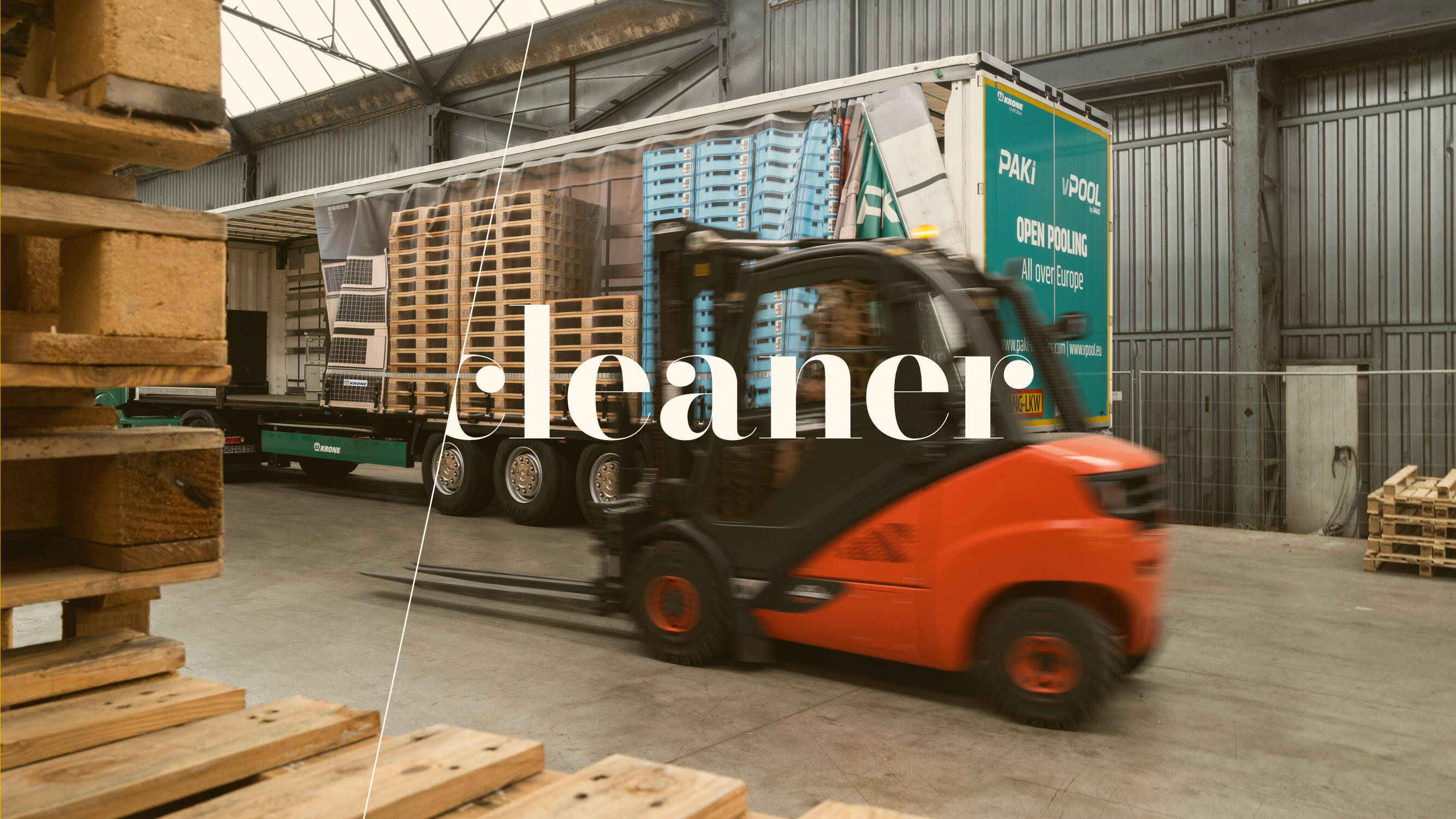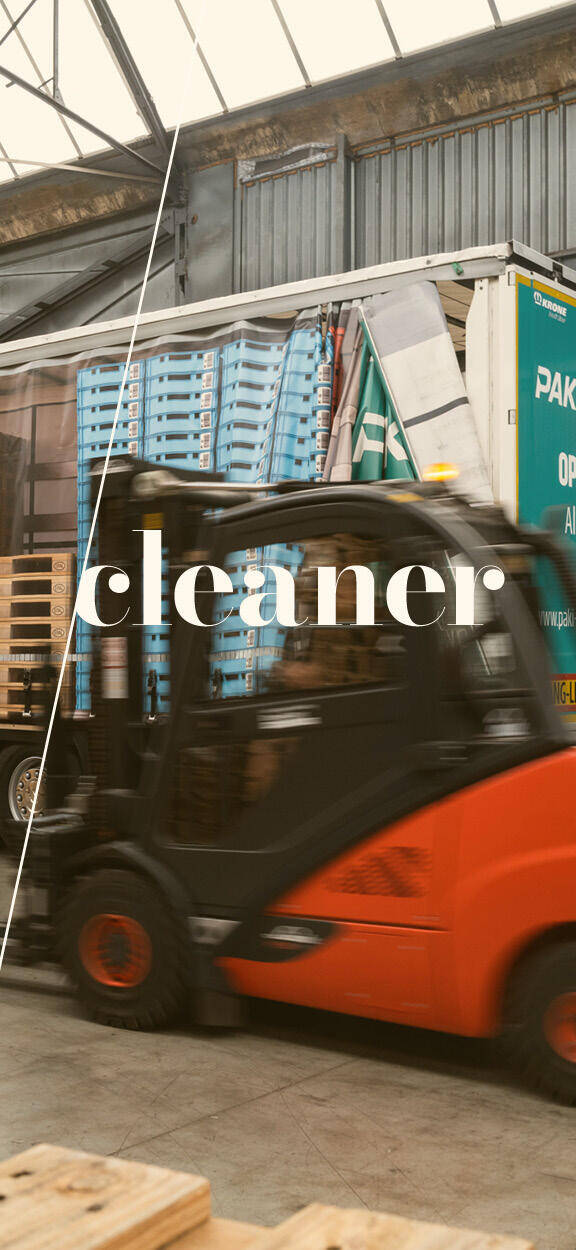IPP France’s FRET21 Programme to
reduce carbon emissions from transport

Moving forward
with cleaner transport.

Angeliki Karydi

Four focus areas
“Those carbon reduction efforts are focused on four focus areas of work”, Angeliki continues. “First of all – load optimisation. Improving load efficiency is a cornerstone of IPP France’s sustainability strategy. By consolidating pallet collections and optimising pallet height, we aim to reduce the number of trailers on the road. The IPP France collections team is developing solutions to increase the number of pallets per trailer, while collaborating with retailers to standardise pallet stacking and raise awareness about the benefits of load optimisation. Secondly, we aim to reduce the distance travelled. Minimising unnecessary transport distances is another major focus area. By reducing the need for pallet relocations, IPP France is cutting emissions associated with long-haul trucking. This strategic approach not only lowers carbon output but also enhances overall transport efficiency.”
“Thirdly, the increase of using sustainable transport methods. To further reduce its environmental impact, IPP France is working to increase the use of rail transport as an alternative to road freight. Additionally, we are expanding the use of Hydrotreated Vegetable Oil (HVO) and B100 fuel lines, a key initiative to lower emissions associated with conventional fossil fuels.”
“And finally, responsible purchasing and supplier engagement. Sustainability is being embedded into IPP France’s procurement processes. We are actively engaging with transport suppliers by reviewing tenders to gain deeper insights into the current landscape in France. Through this process, we are working closely with hauliers to support and encourage their transition to biofuels, fostering a more sustainable supply chain. By assessing the balance between cost and CO₂e reduction, IPP France is making informed decisions that promote sustainable transport solutions”.
“By implementing these targeted actions, IPP is taking a proactive approach to reducing its carbon footprint and fostering more sustainable logistics practices. Through continuous improvement and collaboration with supply chain partners, IPP is making significant strides toward a sustainable future”, Angeliki concludes.
IPP Sustainability Manager Angeliki Karydi explains: “The FRET21 label is awarded to companies that demonstrate high environmental performance and rigorous control over transport and logistics data, assessed through an independent external audit. By participating in this initiative, IPP France is reinforcing its sustainability commitments while optimizing operational efficiency to lower its carbon footprint. In 2024, IPP France avoided 374 ton CO₂e in transport emissions and successfully reduced the carbon intensity per trip from 0.38 kg CO₂e
in 2023 to 0.34 kg CO₂e in 2024.”
As part of its ongoing commitment to environmental sustainability, IPP France has joined the FRET21 programme, an initiative led by ADEME (the French Environment & Energy Management Agency). This programme encourages businesses to integrate transportation impact into their sustainability strategies, aligning with broader corporate social responsibility (CSR) objectives. Through this initiative, IPP France has pledged to reduce its greenhouse gas (GHG) emissions from transport by 5 % between 2023 and 2025.
Sustainability Progress Report | 2024
IPP France’s FRET21 Programme to
reduce carbon emissions from transport

Moving forward
with cleaner transport.

“Those carbon reduction efforts are focused on four focus areas of work”, Angeliki continues. “First of all – load optimisation. Improving load efficiency is a cornerstone of IPP France’s sustainability strategy. By consolidating pallet collections and optimising pallet height, we aim to reduce the number of trailers on the road. The IPP France collections team is developing solutions to increase the number of pallets per trailer, while collaborating with retailers to standardise pallet stacking and raise awareness about the benefits of load optimisation. Secondly, we aim to reduce the distance travelled. Minimising unnecessary transport distances is another major focus area. By reducing the need for pallet relocations, IPP France is cutting emissions associated with long-haul trucking. This strategic approach not only lowers carbon output but also enhances overall transport efficiency.”
“Thirdly, the increase of using sustainable transport methods. To further reduce its environmental impact, IPP France is working to increase the use of rail transport as an alternative to road freight. Additionally, we are expanding the use of Hydrotreated Vegetable Oil (HVO) and B100 fuel lines, a key initiative to lower emissions associated with conventional fossil fuels.”
“And finally, responsible purchasing and supplier engagement. Sustainability is being embedded into IPP France’s procurement processes. We are actively engaging with transport suppliers by reviewing tenders to gain deeper insights into the current landscape in France. Through this process, we are working closely with hauliers to support and encourage their transition to biofuels, fostering a more sustainable supply chain. By assessing the balance between cost and CO₂e reduction, IPP France is making informed decisions that promote sustainable transport solutions”.
“By implementing these targeted actions, IPP is taking a proactive approach to reducing its carbon footprint and fostering more sustainable logistics practices. Through continuous improvement and collaboration with supply chain partners, IPP is making significant strides toward a sustainable future”, Angeliki concludes.
Four focus areas
IPP Sustainability Manager Angeliki Karydi explains: “The FRET21 label is awarded to companies that demonstrate high environmental performance and rigorous control over transport and logistics data, assessed through an independent external audit. By participating in this initiative, IPP France is reinforcing its sustainability commitments while optimizing operational efficiency to lower its carbon footprint. In 2024, IPP France avoided 374 ton CO₂e in transport emissions and successfully reduced the carbon intensity per trip from 0.38 kg CO₂e
in 2023 to 0.34 kg CO₂e in 2024.”
Angeliki Karydi

As part of its ongoing commitment to environmental sustainability, IPP France has joined the FRET21 programme, an initiative led by ADEME (the French Environment & Energy Management Agency). This programme encourages businesses to integrate transportation impact into their sustainability strategies, aligning with broader corporate social responsibility (CSR) objectives. Through this initiative, IPP France has pledged to reduce its greenhouse gas (GHG) emissions from transport by 5 % between 2023 and 2025.
Sustainability Progress Report | 2024